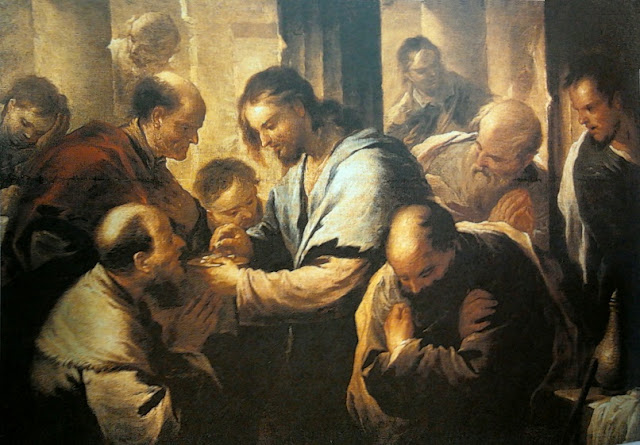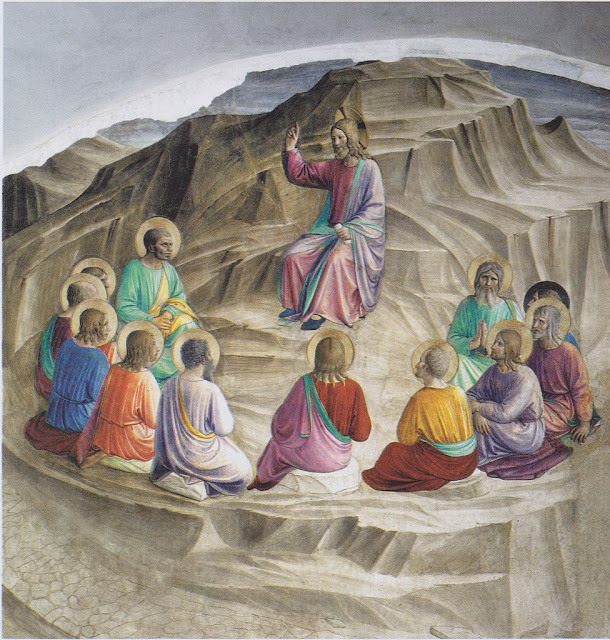Have you ever heard the saying, “Bad things come in threes”? Sometimes it seems like personal challenges, unfortunate events, even the passing of loved ones or celebrities come in threes. At the same time, we can also think of trios of good things. For example, the Declaration of Independence speaks of the inalienable rights of life, liberty, and the pursuit of happiness. At the heart of our Christian life are the three theological virtues of faith, hope, and charity. Lately, I’ve been craving a good BLT – bacon, lettuce, and tomato sandwich. Probably only because it’s Lent.
But it turns out that the truth is not so much that things happen in threes but rather that is how we humans process what happens. Scientists say that our minds are naturally inclined to grasp information and concepts that come in threes, and so this Rule of Three, as it is known, is used by those who want to convey information to others – marketing executives, public relations professionals, and yes, preachers. If you noticed, I’ve used the Rule of Three so far in this homily, first by giving you three examples of bad things, then three lists of good things, and finally three groups of people that follow the Rule of Three.
In the Gospel today, Jesus is tempted by the devil three times. Considering the fact that he was in the desert for forty days and nights, he probably experienced more temptations than that, but we are told about these three specific instances. Perhaps that’s because they were the most insidious moments of temptation, or perhaps because they were the ones that came at the end of his time at the desert. Or maybe it’s because for some reason our minds can grasp these temptations and also how Jesus resisted them. That’s why the Church always gives us the story of Jesus’s trials in the desert on the First Sunday of Lent – not to focus on the deceptive words of the devil, but instead to understand how to imitate Jesus in recognizing and rejecting temptations. Let’s take a closer look at each of these temptations, but let’s do so while also considering another example of the Rule of Three: fasting, almsgiving, and prayer. If you came to Mass on Ash Wednesday, you heard Jesus speak about these three penitential practices and the particular way that he wants us as his disciples to do them. I think there are clear connections we can draw between those three penitential practices and how they can help us in moments of temptation.
The first attempt of the devil is to try to lure Jesus into giving in to his hunger by turning stones into bread. This temptation is rooted in the sensual desires of the body: our human appetites for food, drink, sleep, sexual desire, and leisure. These inclinations are part of our humanity, but they can go awry, and often we are tempted either to overindulge in these pleasures or to satisfy them in a way that is not in accord with the higher purposes of our souls. It is even possible for human beings to becomes slaves to our basic animal instincts, such that we ignore the spiritual calling that God gives to each of us.
Jesus resists this first temptation by continuing to do that which he was already doing: by fasting. He tells the devil, “One does not live by bread alone but on every word that comes forth from God.” Jesus would eat again eventually, of course, but at the moment he was focused on denying his bodily appetite for food in order to increase his spiritual reliance upon God. You and I need food to live, but we are not mere animals; we are not slaves to sensual pleasure. We are rational creatures with immortal souls, who survive not only by the desires of our bodies but also by the attitudes and orientations of our hearts. When our appetites for food, sleep, sexual desire – or for alcohol, social media, TV or internet, hobbies or entertainment, or whatever else – when these begin to go awry, fasting can help us to reengage with the God who has created us, redeemed us, and made us for himself. By fasting, we say “No” to the temptation to be dominated by the desires of our bodies in order to freely say “Yes” in a new way to God.
The second temptation is the devil’s attempt to have Jesus throw himself down from the parapet of the temple, telling him the angels will surely save him. This temptation is more subtle than physical desire; it’s an invitation to pridefulness and seeing the world through the lens of our own ego. When our day to day lives are focused on the satisfaction of our own wills, and if our relationships with others are mostly framed around the way in which they are beneficial to us, then we are probably falling victim to this temptation. This kind of pridefulness can even tempt us in our relationship with God, if we believe that he will always favor us in everything we do in this life and never permit any challenge or suffering to befall us.
Jesus rejects this temptation by telling the devil not to put God to the test. In other words, our reliance on God needs to be deeper than the childish attitude of demanding he prove his love for us. When we are inclined toward making ourselves the center of the universe, or even the center of our own universe, it’s a good moment to practice some self-denial, and giving alms can be a helpful way of doing this. The purpose of almsgiving is more than just giving money to the needy. It’s about remembering that all that we have is really a gift from God and that he will continue to sustain us in precisely the way we need, without asking him to constantly prove it. Almsgiving decreases our overdeveloped attention to ourselves and increases our focus on both God and neighbor.
 |
| Ilya Repin, "Get Behind Me, Satan!" (1895) |
In the final temptation, Jesus is shown all the magnificent kingdoms of the world. He is told that these will be given to him if only Jesus bows down in worship to the devil. This temptation is maybe the most devious, the most insidious. This is the classic “deal with the devil,” in which we are told that all of our human desires will be fulfilled if only we hand over our souls. This temptation sometimes manifests itself in greed, or in the temptation to power, and it is connected to the previous temptation, to pridefulness and ego. But at its heart, it’s rooted in the willingness to seek our ultimate fulfillment in something or in someone in this life, rather than in God and in eternal life with him.
Jesus’s response to this last temptation is very straightforward: God alone is to be worshiped and served. In a sense, this is the answer to every temptation. Every day we are tempted to sin, sacrificing sacrifice some lesser good for the ultimate good of eternal life with God. In this way, we are always being tempted to worship something in place of God. That’s why prayer must have a principal place in our lives every day, a time and a location in which we can remember that the God of our lives is not possessions or pleasure or power or prestige, nor is it any person in our lives, except the God of Jesus Christ. Fasting and almsgiving are important, but my own view is that prayer should be the most important spiritual practice that we focus on, especially in Lent. By the worship of God, in our private prayer and in the liturgy, we place God in his proper place at the center of our lives.
Friends, as we start this Lent, we are all being tempted in some way or another, and we will continue to be throughout these forty days. The devil wants to distract us from using this time to deepen our dependence upon God. When those bad things come, remember the Rule of Three. By the penitential practices of fasting, almsgiving, and prayer, we can arm ourselves against temptation and resist it when it comes. Just as Jesus did, so too he teaches us to do, for he is also present in those moments of temptation, always giving us the strength we need to fight off the devil. May the graces of this Eucharist assist us in striving well in this Lent to rely upon God, to trust in his love, and to worship him alone.

_-_Google_Art_Project.jpg)





_-_Buckwheat_Harvest_-_Summer_-_WGA15694.jpg)






_-_James_Tissot.jpg)

